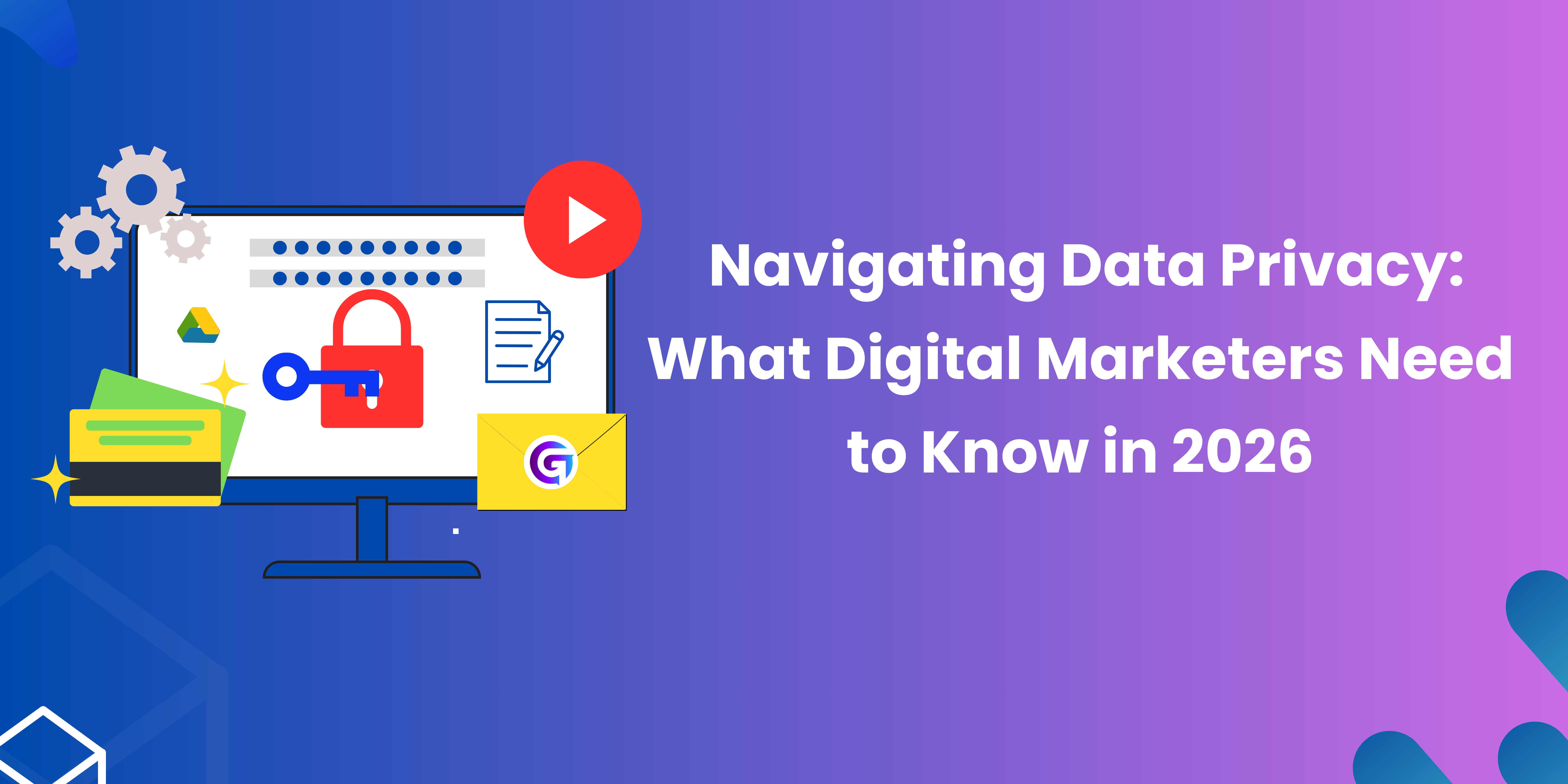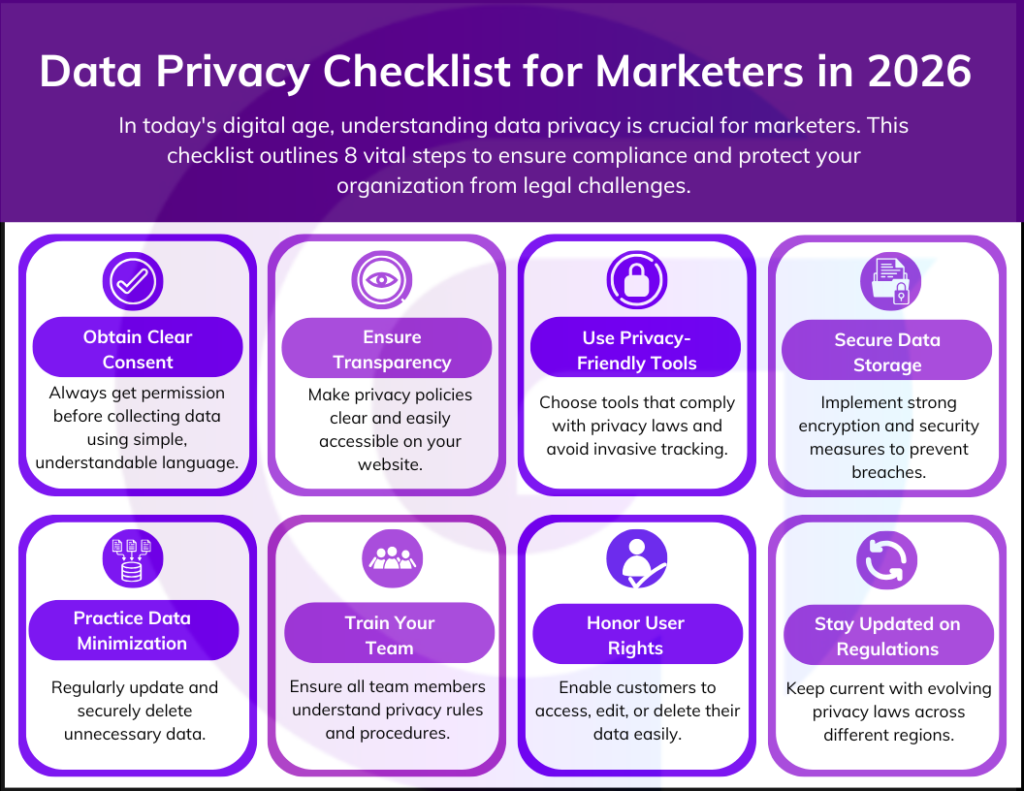In today’s digital world, it’s important for businesses to offer a customized experience to their customers. To fulfill this demand, customer data is used to send emails and customize ads. But the global data protection regulations have been updated recently, making it a concerning fact for marketers. Digital marketing service providers have to be more careful about how they collect information and how that gets used.
Read this blog till the end to stay updated about the new rules and regulations, and continue growing your lead generation services.
Why Data Privacy Matters in Digital Marketing?
The concern over how people’s data gets used is rapidly growing, demanding better control over their data. To respect this privacy-first marketing trend, tech giants like Apple and Google have already modified their data collection strategies. From phasing out third-party cookies to letting the user block activity-tracking apps, businesses are brainstorming new ideas to lead generation services while taking care of their privacy.
Global Data Protection Regulations
Countries globally have introduced strict laws. The following are some of the laws that one must be careful about.
- Businesses in Europe have to follow GDPR. A law that requires you to get permission before using data.
- In California, USA, CCPA/ CPRA lets the customer know what data is being collected and also provides a provision for deletion on request.
- There is the LGPD in Brazil, which is similar to GDPR.
- China has PIPL to regulate the collection and use of personal data.
Privacy-First Marketing Trends in 2026
- Businesses globally are moving towards first-party data collection rather than using third parties. This means that customer data is collected directly from customers through methods like newsletters, forms, etc.
- Digital marketing service providers are implementing contextual advertising. This type of advertising doesn’t track the users solely, but shows relevant ads according to what the customer is viewing.
- To meet the changing trend, even AI is getting included in digital marketing solutions for privacy. AI tools play a significant role in analyzing data, detecting related risks, and guiding companies to follow the rules.
- The trend of following a transparent privacy policy is rising. Businesses these days are letting the customer know about what data is being taken and also letting them have control over how much gets shared.
Digital Marketing Solution to Overcome the New Privacy Rule
Digital marketers are finding new lead-generation services that respect user privacy yet ace the marketing game.
- Instead of using third-party services, marketers can opt for customer-direct data to attract potential customers. Some of the ways of collecting data directly are via collecting emails through sign-up forms and offering content of user interest in exchange for the data. Using chatbots to interact with customers is another way.
- Using CMPs, aka consent management platforms, to ensure the data shared is as per the customer’s consent. These platforms also let customers update or edit their data at any time, making it more user-friendly.
- Secure data storage and encryption also come under the data privacy checklist for marketers. It is their responsibility to protect the user data from hackers. Companies should go for a double opt-in process for confirming email subscriptions, along with multi-factor authentication to protect data.
- Contextual advertising is on the rise while Google is focusing on phasing out third-party cookies, making it evident for businesses to follow the trend. Contextual and AI-driven advertising analyses customer behavior and comes up with relevant advertising, without neglecting rules. This type of advertising method analyses customers’ viewing interest and shows ads similar to that.
Data Privacy Checklist for Marketers to Follow
To ensure data privacy compliance in 2026, businesses should follow the following checklist. Also, maintaining these will keep the marketers away from legal affairs.
- Consent matters. Always take permission before collecting personal user data. Instead of legal, complicated terms for asking consent, opt for simple-to-understand language.
- Users should know how their data is being used. Update the privacy policy accordingly and make sure that is easily available on your website, making it even clearer to the users.
- Opt for tools that are privacy-friendly and in accordance with the updated laws. Using tracking tools to gather data should be ignored.
- Encryption and secure data storage should be carefully taken care of to avoid breaches.
- Update and clear unnecessary data. While clearing up old data, make sure it’s deleted securely, preventing any unethical usage.
- To ensure the best digital marketing solutions for privacy, the team must be well-trained. Every member working in the privacy department should know and understand the rules well and be able to follow it properly.
- On request, customers should be able to edit or delete their data. Companies enabling easy data access and deletion will stay ahead in line in terms of protecting privacy.
- Privacy laws are evolving continuously, making it important for businesses to stay up to date with them.
What is the Future of Data Privacy in Digital Marketing?
As technology is evolving every day, the law for protecting data privacy is also becoming stricter day by day. It is predicted that in the future, the laws will become even more difficult. Here are some predictions for the future of data privacy that will help in offering better digital marketing services:
- Stricter global data protection regulations are needed to respect users’ consent and control of their data.
- Vast implementation of AI and blockchain to protect user data and also to help businesses detect privacy risks in advance.
- It will be almost impossible to follow privacy-first marketing trends for business since, by the end of 2025, Google will be phasing out third-party cookies.
- It is predicted that shortly, customers will have better control over their data; businesses have to operate accordingly.
- The importance of transparent marketing will become a go-to trend in the near future, making it a win-win situation for brands that are open about their data practices.
Final Thoughts
Businesses that want to achieve success can not avoid digital marketing services, as that is the best way to stay closer to the customers. And for digital marketers, it’s absolutely necessary to gather and use user data. Now as the global government is becoming concerned about data privacy, new rules are being implemented, making it absolutely necessary for marketers to obey those.
To maintain a strong relationship with the audience through lead generation services, the best strategy is to stay in compliance with global rules and implement newer methods. Global laws like GDPR, CCPA, LGPD, and PIPL must be followed to ensure good business worldwide. First-party data collection and user approval should also be taken care of.
Apart from these, companies should also consider updating their policies and using privacy-friendly tools. To detect privacy-related risks, AI and blockchain can also be used.
By adopting the newly rising marketing trends that respect customers’ consent and value their privacy, marketers can help businesses grow better in the digital landscape.


